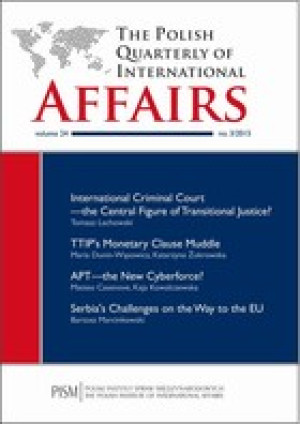
The Polish Quarterly of International Affairs nr 3/2015
Producent: Polski Instytut Spraw Międzynarodowych
The Polish Quarterly of International Affairs nr 3/2015 PRACA ZBIOROWA Articles Matteo Casenove, Kaja Kowalczewska APT-the New Cyberforce? The authors explain the Advanced Persistent Threats (APT) phenomenon in the context of the legal and technical one perspectives. The APT definition is juxtaposed with the legal term of armed attack. Legal reflections are concentrated on the characteristics of the APT and try to explain whether this category is sufficiently unambiguous and consistent to serve as a powerful argument in legal analysis, which is especially important to the decision-makers in the context of self defence and the legality of a military response to a cyberattack. The technical perspective adds complexity to APT analysis due to the intrinsic characteristics of the malware, and more generally of the cyberattack. Therefore, the authors argue, analysis cannot merely focus on the technical context, and they underline the necessity for integration with the geopolitical and military context in order to provide a more exhaustive view of the attack and to support the attribution process. Justin Dunnicliff, Paulina Iżewicz Civilian or Military? Addressing Dual-use Items as a Challenge to the Nuclear Non-proliferation Regime Various efforts have been made to establish export controls and other mechanisms that would prevent illicit nuclear trade from occurring. These tools have been fairly successful in capturing illicit transactions of goods whose application is purely nuclear. The goods and technologies that can be used for both military and civilian purposes, the dual-use items, remain the key challenge. The legitimate market for such goods is enormous, but they also have applications in centrifuge, laser enrichment, reactor, and plutonium separation programmes. Iran and other proliferators have a long history of attempted procurements in this area, including items such as valves, frequency converters, carbon fibre, machine tools, and many others. The current non-proliferation regime has been slow to catch up with this reality. It is crucial to reverse this trend and adapt international standards, to provide a more holistic approach to countering nuclear proliferation. Karolina Kuśmirek Polish Special Operations Forces: Role and Missions in Afghanistan Polish Special Operations Forces have participated in missions abroad, for example, in Afghanistan. In the initial phase, special forces soldiers were assigned to the tasks that could be performed by conventional military units, such as protection of bases, but over time the situation changed. Their actions contributed to stabilising the situation in the region and indirectly resulted in increased international security. During the operations, soldiers released hostages and confiscated weapons. In this way they disrupted the opponent, because the losses incurred by terrorists led to the depreciation of the position of the leaders of the terrorist networks. In addition to special operations, soldiers were preparing Afghani Tigers officers to carry out activities independently, and to ensure safety after the coalition forces left the region. Cooperation of soldiers with the Afghan officers is the proof of success in building positive relationships. Implementation of special operations by special forces soldiers led to their gaining new experience, and to the modernisation of armaments and verification of procedures. The activities conducted proved that Polish special forces are a reliable partner. Tomasz Lachowski International Criminal Court the Central Figure of Transitional Justice? Tailoring Post-violence Strategies, with Special Reference to Ukraine This paper is devoted to analysing the factual and potential influence of the International Criminal Court (ICC) in a conflict and post-conflict environment. It is argued that the ICC`s capacity has to be measured by its ability to tackle the hard-cases, both geopolitically and legally, and to serve as a real means of implementing transitional justice strategies applied by post-violence societies. The initial evaluation of the ICC`s capacity in the field of international and transitional justice is compared with the current situation in Ukraine, since Kyiv has lodged two ad hoc declarations under Article 12 (3) of the Rome Statute. The first accepted the jurisdiction of the ICC with reference to Maidan crimes that occurred during the winter of 2013 to 2014, and the second covers the possibility of crimes against humanity and war crimes committed in the course of warfare in the Donbas region. Undoubtedly, careful analysis of the I`s presence in the Ukrainian crisis is required. Bartosz Marcinkowski Balkan`s Bad Boy Goes West: Serbia`s Challenges on the Way to the EU Since the Balkan Wars in the 1990s, Serbia has been perceived by Europe as its enfant terrible. This is an effect of Serbian war crimes, of an unwillingness to cooperate with the International Criminal Tribunal for the former Yugoslavia, and general reluctance towards Western political structures in
Sklep: gandalf.com.pl
Cena:
18.99
18.23
Przejdź do sklepu